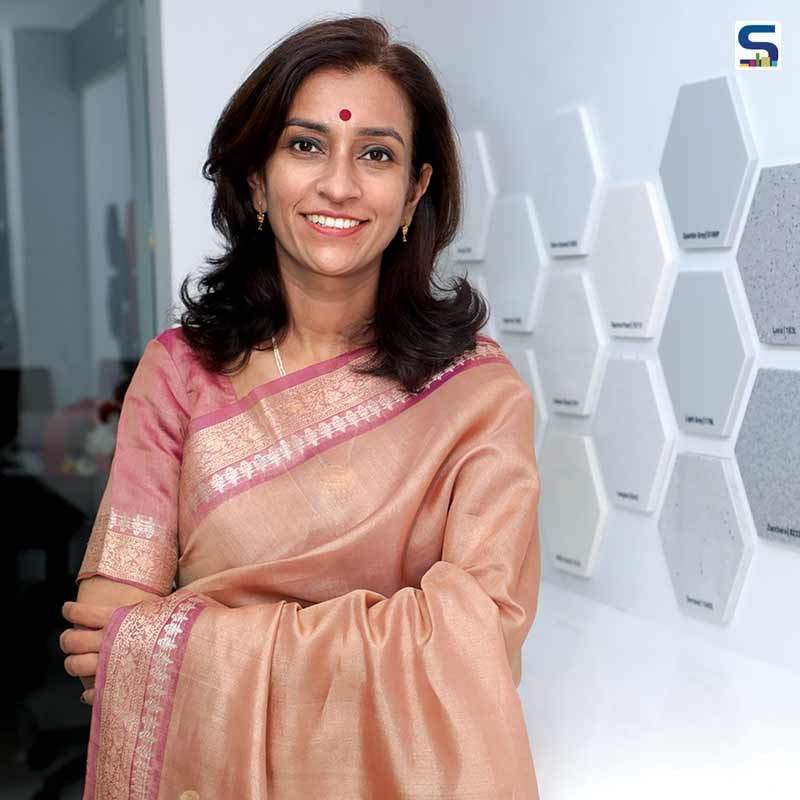
REHAU is a German based brand, started in India in 1997. The company had set-up its first manufacturing facility in Pune, Maharashtra. REHAU India is one of the leading global players in the Furniture and Building industry. The company is a solution provider for various industries such as construction and automotive. Currently, the company has 3 plants in India, i.e., 2 in Pune and 1 located in Vadodara. They use advanced German technology to provide polymer-based solutions in construction and automotive industry. REHAU is also one of the major manufacturers and distributors of German-quality uPVC Edgebands, solid surface, pre-laminated boards, laminates, flooring, underfloor heating and cooling solutions etc. It has recently completed 25 years in the Indian market.
Bhavana Bindra, Managing Director, REHAU South Asia, talked about the same with Vertica Dvivedi, Editor-In-Chief, SURFACES REPORTER Magazine.
How has been the journey of REHAU in India?
Started off in 1997 with only sales office in the country, REHAU India has completed 25 years in the country this year along with setting up three manufacturing plants. While, two plants are serving the furniture business, the other one is dedicated to the industrial business. REHAU is the pioneer of Edge banding in the country and has introduced cutting – edge solutions including anti-bacterial, anti-fungal or varied colour keeping the users’ multiple needs in mind.
Along with Edge Banding, there has been a number of products introduced by REHAU including, laminates, boards, panels, adhesives, etc. Having started off primarily in the B2B segment, REHAU is currently venturing out and looking forward to spread its wings in the B2C segment with the launch of REHAU Kitchen.
Kindly eleborate about REHAU’s foray into B2C segment with REHAU Kitchen?
REHAU is known for launching products as per the customers’ requirements and provide seamless backend support in terms of innovation, supply chain management etc. Whether it is the new RAUVISIO solid surface for the kitchen slabs or sourcing hardware and accessories which are of the European standards, we work as per customers’ expectations. We have recently launched REHAU Kitchens in Bangalore and are looking at gradually expanding to other cities in the southern part and later moving to the rest of the country. The intent is to appoint right partners who would be our point of sales. Currently, we have one Experience Center in Bengaluru which provides a glimpse of what we can do with REHAU kitchens. Very soon, we will be launching one in Mumbai and in Delhi as well.
Having started off primarily in the B2B segment, Rehau is currently venturing out and looking forward to spread its wings in the B2C segment with the launch of Rehau Kitchen.
What are the current trends in building material industry for 2022-23?
Digitization is the biggest trend in 2022-23 where currently we are ensuring that everything that we need to do across the value chain can be done in a manner where we can save time, cost, and energy while providing seamless solutions. Organizations are increasingly relying on technology to support employees. Hence, we can safely assume that digitization is penetrating in every aspect of the business. 3D pintring will also be increasing in the coming time. Sustainability would be the other crucial trend on which REHAU is focusing on through its activities including recycling the waste generated in our plants or using it again in production wherever possible.
Bhavana Bindra, Managing Director, REHAU, South Asia
A staunch believer of taking the path less travelled, Ms Bhavana Bindra has always been passionate about leaving an impact by chartering unprecedented territories. Post taking the helm at REHAU, a globally renowned brand in Polymer-based solutions, Ms. Bindra’s focus is on the growth and expansion of the brand in the South Asia region. Under her visionary leadership, REHAU is on its way to becoming a force to reckon with in South Asia, especially India.
Being a woman leader in a predominantly male business, how has the time changed since you started?
When I first joined the manufacturing and engineering space with an organisation spread across various verticals including power generation, automotive, mining, construction etc., there were around 7% women, most of whom were not even in the core business. From there, I became one of the first women leaders to handle one of their key businesses. With the changing time, organizations are becoming sensitive towards women being a part of their work force.
However, such sensitivity has to be substantiated with the changes at the micro levels. From having washrooms available on remote sites for both genders to planning for other necessities are the major changes happening in the current work culture.
The major challenge comes when you meet customers or vendors who may not be as sensitive and here you are at remote locations without the basic necessities being available. However, the awareness is increasing as more women are willing to take the plunge in the business. So, I think for us it is important that one doesn’t get deterred by such issues.
Secondly, organizations have started to realise that women often perform multiple roles at the same time which doesn’t mean that they are not committed towards their jobs. The realization is resulting in guidelines and policies for the sensitization of workforce to accommodate the needs of women including flexible work hours.
Such changes make the work environment more amicable for both men and women and pushes productivity of the workforce to the maximum. Another challenge is the mindset where people are used to find males at the authoritative positions and hence avoid making eye contact while making a conversation with a woman. It is not disrespecting, rather a cultural mind set which we should understand, empathise and not give up.